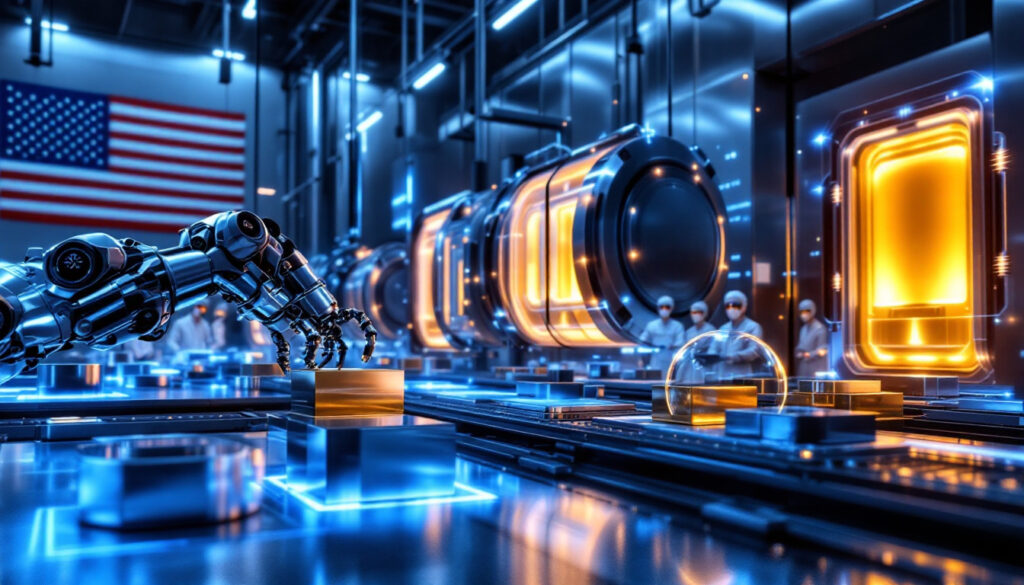Lyten Begins U.S. Production of Battery Grade Lithium-Metal: Transforming the U.S. Battery Supply Chain
Lyten, a leader in lithium-sulfur battery technology, has initiated the United States' first production of battery-grade lithium-metal foil, marking a pivotal advancement in domestic battery manufacturing. By localizing the supply chain for both sulfur cathodes and lithium-metal anodes, Lyten addresses critical vulnerabilities in U.S. reliance on foreign-sourced minerals like nickel, manganese, cobalt, and graphite. This innovation aligns with national security priorities and positions the U.S. to compete globally in next-generation battery production. With strategic partnerships and significant financial backing, Lyten's efforts are set to revolutionize applications ranging from electric vehicles to aerospace.
What is Lithium-Metal and Why is it Important for Batteries?
Understanding Battery Grade Lithium-Metal
Battery-grade lithium-metal represents a purified form of lithium optimized for electrochemical performance in advanced battery systems. Unlike traditional lithium-ion batteries, which use lithium compounds intercalated in graphite anodes, lithium-metal batteries employ metallic lithium directly. This configuration enables significantly higher energy density—lithium-metal provides a theoretical capacity exceeding 3,860 mAh/g compared to graphite's modest 372 mAh/g.
Lithium-metal's superior conductivity also allows for faster charging rates while reducing internal resistance within cells. The material's lightweight nature (lithium is the lightest metal on the periodic table) makes it particularly valuable for applications where weight reduction offers substantial benefits, such as electric vehicles and aerospace technologies.
Industrial-grade lithium requires extensive purification and processing to reach battery-grade quality. Impurities as low as parts per million can significantly impact cell performance and longevity, making the production process highly specialized and technologically sophisticated.
The Strategic Importance of Lithium-Metal in Next-Generation Batteries
Lithium-metal represents the ultimate endgame for high-energy-density battery anodes. While current lithium-ion technology has approached theoretical limits, lithium-metal unlocks an entirely new performance horizon. The energy density improvements offered by lithium-metal anodes (up to 80% higher than current commercial cells) could extend EV ranges beyond 500 miles per charge while reducing battery pack size and weight.
Beyond performance advantages, lithium-metal's strategic importance relates to supply chain security. Traditional lithium-ion batteries rely heavily on materials controlled by a handful of countries, particularly China. By developing domestic lithium-metal production capability, the U.S. creates resilience against reshaping commodity markets while positioning its manufacturing sector in a high-growth industry.
The Department of Energy has identified lithium-metal battery technology as a critical focus area, allocating over $200 million in research funding since 2021. Industry analysts project that lithium-metal batteries could capture up to 25% of the global advanced battery market by 2030, representing a potential $50 billion opportunity.
How is Lyten Revolutionizing U.S. Battery Manufacturing?
Establishing America's First Battery Grade Lithium-Metal Production
Lyten has successfully developed proprietary processes for creating ultra-thin lithium-metal foils specifically engineered for lithium-sulfur battery applications. Their San Jose facility houses specialized equipment for lithium purification, alloying, extrusion, and precision rolling—technologies previously unavailable at commercial scale within the United States.
This manufacturing breakthrough represents more than just technical achievement; it establishes an entirely new domestic supply chain segment. Previously, U.S. battery makers relied almost exclusively on imported lithium-metal, primarily from Asian suppliers with ties to Chinese processing facilities. Lyten's production eliminates this dependency, creating a secure source for this strategic material.
The company's collaborative approach with domestic partners like Creative Engineers, Inc. reflects a broader strategy of rebuilding America's advanced materials capabilities through targeted innovations and specialized manufacturing expertise. This collaborative model accelerates commercialization while distributing economic benefits across multiple regions and industrial sectors.
Eliminating Critical Mineral Dependencies Through Lithium-Sulfur Technology
Lyten's lithium-sulfur battery chemistry represents a fundamental departure from conventional lithium-ion technology. By pairing lithium-metal anodes with sulfur cathodes, Lyten eliminates dependence on several constrained material supply chains: nickel, cobalt, manganese, and graphite—all dominated by Chinese processing and manufacturing.
The company sources elemental sulfur domestically as a byproduct from petroleum refining and natural gas processing. This abundant material (considered industrial waste in many contexts) costs a fraction of the transition metals used in conventional batteries while offering superior theoretical energy capacity. The sulfur-based cathode requires minimal processing compared to traditional lithium-ion cathode materials, further reducing manufacturing complexity and environmental impact.
Celina Mikolajczak, Lyten's Chief Battery Technology Officer and former Tesla and Panasonic executive, emphasizes this advantage: "By removing dependency on critical minerals from our battery chemistry, we've created a technology that's not only more energy-dense but also insulated from the supply chain bottlenecks that have plagued the battery industry. Our lithium-metal production capability completes this vision of a truly domestic, truly sustainable battery ecosystem."
What Makes Lyten's Supply Chain Approach Unique?
Creating a Fully Localized Supply Chain for Sulfur Cathodes
Traditional lithium-ion battery manufacturing involves complex global supply chains spanning multiple continents. Raw materials might be mined in Africa, processed in China, manufactured into components in South Korea, and assembled into cells in Europe or the U.S. This fragmented approach creates vulnerability to trade disputes, shipping disruptions, and geopolitical tensions.
Lyten has pioneered a radically different model by focusing on locally abundant materials. Their sulfur cathodes utilize refined sulfur from U.S. petroleum and natural gas operations—material that would otherwise require costly disposal. This approach transforms an environmental liability into a valuable battery component while eliminating transoceanic shipping and its associated carbon footprint.
The company has established partnerships with multiple domestic sulfur producers to ensure redundant supply, with processing facilities strategically located near these sources. This distributed manufacturing approach provides resilience against regional disruptions while creating jobs in areas transitioning away from fossil fuel production.
Developing U.S.-Made Lithium Alloys and Domestically Sourced Lithium-Metal
Lyten's partnership with Creative Engineers, Inc. (CEI) in Pennsylvania has yielded specialized lithium alloying and processing equipment designed specifically for battery applications. This collaboration leverages CEI's expertise in reactive metals handling and Lyten's battery engineering capabilities to create custom lithium foils with precisely controlled composition and microstructure.
The lithium feedstock itself comes from a facility in the Eastern United States that processes lithium compounds into pure metal. While most global lithium mining occurs in Australia, Argentina, and Chile, the critical value-added processing has been predominantly done in China. Lyten's approach shifts this high-value processing step back to American shores.
Dan Cook, Lyten's CEO, notes the significance: "Controlling our lithium-metal production gives us unprecedented flexibility to optimize our material specifically for lithium-sulfur chemistry. This isn't just about securing supply—it's about creating the exact form factor and purity level that maximizes our battery performance. You simply can't achieve this level of customization with imported materials."
What Are the National Security Implications?
Addressing U.S. Battery Industry Vulnerabilities
The Department of Defense has identified energy storage as a critical vulnerability in modern military systems. From soldier-portable electronics to unmanned aerial vehicles and satellite systems, battery performance directly impacts operational capabilities. Current supply chains force defense contractors to rely on foreign-sourced materials, creating security risks and compliance challenges.
Lyten's domestic lithium-metal production addresses these concerns by providing a secure supply of high-performance battery materials that meet stringent military specifications. The company's lithium-sulfur technology offers additional advantages for defense applications, including improved safety (no thermal runaway risk), operation in extreme temperature environments (-40°C to +60°C), and significantly higher energy density for extended mission duration.
Beyond direct military applications, the national security implications extend to critical infrastructure protection. Grid-scale energy storage using domestically-produced batteries reduces vulnerability to foreign interference while supporting integration of renewable energy sources—a key element of energy independence.
Compliance with National Defense Appropriations Act (NDAA) Requirements
The National Defense Authorization Act has increasingly restricted the use of Chinese-origin materials and components in U.S. defense systems. Section 889 specifically prohibits the use of certain telecommunications equipment, while other provisions restrict battery materials and technologies from "foreign entities of concern."
Lyten's fully domestic supply chain ensures complete compliance with these requirements, allowing defense contractors to integrate high-performance energy storage without regulatory complications. This compliance extends beyond the final product to encompass the entire manufacturing process, including equipment, materials, and intellectual property—areas where many competitors still maintain Chinese dependencies.
The company has implemented rigorous supply chain verification protocols to document material provenance through all processing steps. This transparency provides assurance to government customers while establishing a model for other critical technology sectors seeking to address similar supply chain vulnerabilities.
How Does Lyten's Technology Differ From Traditional Batteries?
The Lithium-Sulfur Battery Advantage
Lithium-sulfur batteries operate on fundamentally different electrochemical principles than lithium-ion. While lithium-ion batteries store energy through intercalation (inserting lithium ions into electrode structures), lithium-sulfur batteries use conversion reactions that completely transform the cathode material during cycling. This difference enables much higher theoretical energy density—nearly three times greater than current lithium-ion cells.
Practical advantages include weight reduction of 40-50% compared to equivalent-capacity lithium-ion batteries, making lithium-sulfur particularly valuable for weight-sensitive applications like electric aviation. The technology also demonstrates superior cold-weather performance, maintaining over 80% capacity at -20°C where conventional lithium-ion might deliver less than 50%.
Safety represents another significant differentiator. Lithium-sulfur cells contain no oxygen-releasing compounds, eliminating the risk of thermal runaway reactions that have plagued some lithium-ion chemistries. This inherent safety reduces cooling system requirements and simplifies pack design while enabling use in applications where safety margins are paramount.
Eliminating Dependency on Nickel, Manganese, Cobalt, and Graphite
Traditional lithium-ion batteries rely on cathodes containing varying combinations of nickel, manganese, and cobalt—materials subject to significant price volatility and supply constraints. Cobalt in particular faces ethical sourcing concerns, with over 70% of global production coming from the Democratic Republic of Congo where mining practices have raised human rights issues.
Lyten's lithium-sulfur technology completely eliminates these materials, replacing them with abundant, domestically available sulfur. This substitution removes exposure to price fluctuations that have seen battery-grade nickel prices surge by over 300% during supply disruptions.
On the anode side, conventional lithium-ion batteries use graphite—either natural or synthetic—with over 90% of processing occurring in China. Lyten replaces this with domestically produced lithium-metal, eliminating another critical foreign dependency while improving performance. The company's proprietary electrode designs overcome historical challenges with lithium-metal anodes, such as dendrite formation and capacity fade, enabling practical commercial implementation.
What is Lyten's Manufacturing Process for Lithium-Metal?
Collaboration with Creative Engineers, Inc. for Lithium Alloy Production
Lyten's partnership with Creative Engineers, Inc. (CEI) represents a strategic combination of specialized metallurgical expertise with advanced battery engineering. CEI brings decades of experience handling reactive metals in controlled environments, while Lyten contributes precise specifications for battery-optimized materials.
The collaboration has yielded custom alloying equipment that operates under ultra-high purity conditions to prevent contamination. Lithium's high reactivity requires specialized handling techniques, including inert atmosphere processing chambers and specialized transfer mechanisms that prevent exposure to moisture or oxygen throughout the manufacturing process.
This partnership exemplifies how specialized American manufacturing capabilities can be revitalized through targeted technology development. CEI's Pennsylvania facility now produces custom lithium alloys with precisely controlled compositions tailored specifically for battery applications—a capability previously unavailable domestically.
Proprietary Lithium-Metal Foil Extrusion and Rolling Capabilities
At Lyten's San Jose facility, the company has developed specialized equipment for converting lithium alloy ingots into ultra-thin foils with precisely controlled thickness and surface properties. This process involves multiple stages of extrusion and rolling, with thickness gradually reduced to as little as 20 microns—approximately one-fifth the diameter of a human hair.
The precision rolling capability represents a particularly significant technical achievement. Uniform thickness is critical for battery performance, as variations can create "hot spots" that accelerate degradation. Lyten's process maintains thickness tolerance of ±2 microns across continuous rolls, meeting or exceeding the quality of imported materials.
Surface treatment processes apply specialized coatings that enhance electrochemical stability while improving handling characteristics. These coatings play a crucial role in preventing dendrite formation—a historical challenge for lithium-metal batteries—while enabling integration with Lyten's proprietary electrolyte formulations.
How is Lyten Scaling Production?
Current Manufacturing Facilities in California
Lyten's San Jose headquarters houses both R&D operations and initial production capabilities. The facility includes 120,000 square feet dedicated to battery development and manufacturing, with specialized areas for materials processing, cell assembly, and testing under various environmental conditions.
Current production capacity reaches 5 MWh annually—sufficient for specialized applications and partner qualification while supporting ongoing technology refinement. The facility maintains battery industry leading clean room standards, with controlled atmosphere environments for sensitive production steps to ensure consistent quality and performance.
Beyond physical infrastructure, Lyten has implemented advanced manufacturing systems that provide complete traceability from raw materials through final cell production. This digitalisation and energy transition approach enables rapid process optimization while supporting regulatory compliance and quality assurance for demanding applications like aerospace and defense.
Acquisition of Northvolt's Battery Plant in San Leandro
Lyten's recent acquisition of Northvolt's former battery facility in San Leandro, California represents a significant scaling milestone. The 200,000-square-foot facility previously produced conventional lithium-ion cells before Northvolt consolidated operations in Europe. Lyten is repurposing this infrastructure for lithium-sulfur production, leveraging existing clean rooms, utilities, and material handling systems.
This strategic acquisition accelerates Lyten's commercialization timeline by approximately 18 months compared to building equivalent capacity from scratch. The facility will be retrofitted with specialized equipment for lithium-metal processing and lithium-sulfur cell assembly, with initial production targeted for late 2025.
At full capacity, the San Leandro plant will produce up to 200 MWh annually—sufficient to support early commercial applications across multiple market segments. The facility's modular design enables phased expansion as demand grows, with future capacity potentially reaching 1 GWh through additional equipment installation within the existing building envelope.
What Applications Will Benefit From Lyten's Batteries?
Energy Storage Solutions
Grid-scale energy storage represents a natural early market for Lyten's technology. Lithium-sulfur's higher energy density translates to smaller footprint requirements for stationary applications, while the inherent safety profile reduces fire risk in populated areas. The technology's superior cold-weather performance also makes it suitable for deployment across diverse geographic regions.
Several utility partners are evaluating Lyten's batteries for peak shaving and renewable integration applications, with pilot installations planned for 2025. The longer discharge duration (up to 10 hours) compared to most lithium-ion systems makes the technology particularly valuable for overnight storage of solar generation.
Commercial and industrial energy storage users benefit from the reduced weight and space requirements, enabling installations in space-constrained urban environments. The absence of thermal runaway risk also simplifies building code compliance and reduces insurance costs compared to conventional lithium-ion systems.
Electric Vehicle Integration
Lyten's partnership with Stellantis has already produced a working demonstration of the technology's potential in Chrysler's Halcyon concept vehicle. The lithium-sulfur battery pack delivers over 500 miles of range while reducing total pack weight by approximately 30% compared to equivalent lithium-ion technology.
Multiple automotive manufacturers are currently testing Lyten's cells for integration into production vehicles targeted for 2027-2028 model years. The technology's weight advantage translates directly to efficiency improvements, while the domestic supply chain aligns with requirements for Inflation Reduction Act tax credits.
Commercial vehicles represent another promising application, particularly long-haul trucking where weight reduction directly impacts payload capacity and range. Several fleet operators are evaluating Lyten's technology as an alternative to both conventional diesel and first-generation electric powertrains, with pilot deployments expected in 2026.
Aerospace and Defense Applications
Lyten's collaboration with AEVEX Aerospace demonstrates the technology's value for unmanned aerial systems. The weight reduction enables either extended flight time (up to 60% longer) or increased payload capacity for sensors and communication equipment. The absence of thermal runaway risk also simplifies design requirements for aerospace systems.
The upcoming International Space Station demonstration will validate performance in the challenging space environment, including radiation exposure and thermal cycling. Space applications particularly benefit from lithium-sulfur's high energy density, as launch costs correlate directly with weight.
Defense applications extend beyond aircraft to include soldier-portable electronics, autonomous ground vehicles, and maritime systems. The combination of domestic manufacturing, NDAA compliance, and performance advantages makes Lyten's technology particularly attractive for military modernization programs focused on electrification and energy resilience.
What Major Partnerships and Investments
Ready to Capitalise on the Next Major Mineral Discovery?
Discover significant ASX announcements in real-time with Discovery Alert's proprietary Discovery IQ model, turning complex mineral data into actionable investment insights. Explore why historic discoveries can generate substantial returns by visiting Discovery Alert's dedicated discoveries page and begin your 30-day free trial today to position yourself ahead of the market.




